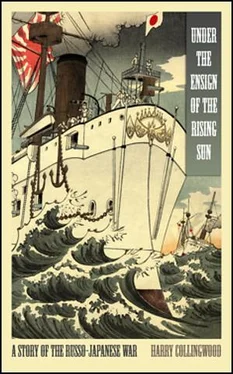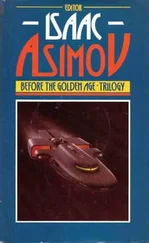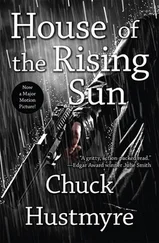Harry Collingwood - Under the Ensign of the Rising Sun
Здесь есть возможность читать онлайн «Harry Collingwood - Under the Ensign of the Rising Sun» весь текст электронной книги совершенно бесплатно (целиком полную версию без сокращений). В некоторых случаях можно слушать аудио, скачать через торрент в формате fb2 и присутствует краткое содержание. Год выпуска: 1916, Жанр: nonf_military, на английском языке. Описание произведения, (предисловие) а так же отзывы посетителей доступны на портале библиотеки ЛибКат.
- Название:Under the Ensign of the Rising Sun
- Автор:
- Жанр:
- Год:1916
- ISBN:нет данных
- Рейтинг книги:4 / 5. Голосов: 1
-
Избранное:Добавить в избранное
- Отзывы:
-
Ваша оценка:
- 80
- 1
- 2
- 3
- 4
- 5
Under the Ensign of the Rising Sun: краткое содержание, описание и аннотация
Предлагаем к чтению аннотацию, описание, краткое содержание или предисловие (зависит от того, что написал сам автор книги «Under the Ensign of the Rising Sun»). Если вы не нашли необходимую информацию о книге — напишите в комментариях, мы постараемся отыскать её.
Under the Ensign of the Rising Sun — читать онлайн бесплатно полную книгу (весь текст) целиком
Ниже представлен текст книги, разбитый по страницам. Система сохранения места последней прочитанной страницы, позволяет с удобством читать онлайн бесплатно книгу «Under the Ensign of the Rising Sun», без необходимости каждый раз заново искать на чём Вы остановились. Поставьте закладку, и сможете в любой момент перейти на страницу, на которой закончили чтение.
Интервал:
Закладка:
The steadily increasing distinctness with which the sound of the firing reached us, proved that we were rapidly overhauling the contending squadrons, and some twenty minutes later we sighted the rearmost ships on both sides, blazing away at each other “hammer and tongs.” Our own cruisers were to the southward of the Russian line, therefore Kamimura led his force to the northward of the enemy, thus placing the latter between two fires, at the same time signalling us to concentrate our fire upon the four Russian battleships, which we did with a vengeance, and within five minutes we were all enveloped in a roaring tempest of flame, smoke, and bursting shells.
But the precision of our fire was infinitely superior to that of the Russians. They fired at least three times as rapidly as we did, but whereas every one of our shells reached its mark, the bulk of theirs flew wide. They were rapidly growing demoralised, and when the fight had been in progress some twenty minutes, their line suddenly broke up into little groups of twos and threes and made off to the northward at top speed, those of us whose speed permitted, following them and keeping up a brisk fire with our forward guns.
Suddenly, as we pursued, two ships were sighted ahead, evidently in difficulties, and a few minutes later we identified them as the Russian battleship Suvaroff and the repair ship Kamschatka . Immediately, Kamimura signalled, ordering their destruction. Then, while we were in the very act of training our guns upon them, another battleship was sighted in the distance. She, too, was evidently in a parlous state, so much so, indeed, that we scarcely had time to identify her as the Alexander Third when she capsized and sank!
Then we opened fire vigorously upon the other two ships, while our destroyers closed in upon the Suvaroff , now listing so heavily that she was almost on her beam-ends. But although she was in such a sorry plight her crew displayed the utmost gallantry, defending themselves from the torpedo craft with the only gun which they could bring to bear. It was a hopeless fight, however; our boats dashed in, time after time, discharging torpedoes at her, and at length two of the missiles got home, one under her stern, and the other in the wake of her engine-room, blowing a great hole in her side. This last finished her; the water poured into her in torrents, and a few minutes later she rolled right over and disappeared. The Kamschatka followed a few minutes later.
Meanwhile, the ships which we had been pursuing had disappeared in the fog, heading northward, in which direction we knew our battleships had preceded them . Therefore, since the hour had now arrived when, according to arrangements, our torpedo flotillas were to take up the game, Kamimura signalled us to reduce speed to ten knots and to shape a course for our appointed rendezvous near Matsushima Island.
The night which followed was an anxious one for all hands, for we were steaming through a dark and foggy night, with all lights out. Nothing untoward happened, however, and with the appearance of dawn on the following morning a little air of wind sprang up and swept the fog away.
It was shortly before three bells in the morning watch (half-past five o’clock a.m.) of 28th May, and the six ships of the Japanese armoured cruiser division were steaming northward in line abreast, when the Tokiwa , which was the easternmost ship, reported smoke low down on the eastern horizon. At once the course was altered eight points to the eastward, and the ships proceeded in line ahead, closing in upon the Tokiwa —the leading ship—as they did so, while Kamimura reported the circumstance by wireless to Togo, who, with his battle squadron, was some sixty miles away to the northward of us. Some twenty minutes later, after a lively bout of signalling by the wireless operators aboard the Japanese ships, it became certain that the smoke seen must proceed from enemy ships, and all our dispositions were made for dealing with them, the instructions of the armoured division being to close slowly in upon the enemy from the westward, while the battleships rushed down at full speed from the north, and the protected cruisers did the same from the south.
The result was that, a few hours later, four Russian battleships, namely, the Orel, Apraxin, Nicolai First , and Seniavin found themselves completely hemmed in by our ships, while the light cruiser Izumrud , availing herself of her superior speed, just managed to escape by the skin of her teeth.
I will say this for them: outnumbered though they were, and hopeless as was their situation, with their ammunition running short, and their crews almost in a state of collapse from nerve strain, those four ships made a gallant defence, and it was not until they were reduced to the very last extremity that Admiral Nebogatoff ordered the white flag to be hoisted over his squadron in token of surrender. Prize crews were at once put aboard the prizes, and they were ordered south to Sasebo under an escort of cruisers, of which the Yakumo was one. The Orel was such a wreck that she was incapable of steaming more than eight knots, consequently we did not arrive in harbour until the afternoon of the following day, when, our wireless messages having prepared the inhabitants for our arrival, we received such an ovation as it thrills me yet to remember.
Chapter Twenty One.
REINSTATED.
It was not until nearly a fortnight later that the full results of the battle of Tsushima became known; then, tabulating the intelligence that came to hand from various points, we were at last in a position to realise the surprising character of the Japanese Navy’s achievement.
Briefly and baldly summarised, it amounted to this: Of the eleven Russian battleships which went into action on that memorable 27th May, four were captured, while the remaining seven were sunk. Of nine cruisers, five were sunk. Of nine auxiliary cruisers, four were sunk and one was captured; while, of nine destroyers, one, the Biedovy , was captured with Admiral Rojdestvensky, seriously wounded, on board, and four were sunk. Twenty-six of the thirty-eight craft which composed the much-vaunted Baltic Fleet were thus accounted for. Of the remaining twelve, three—the small cruiser Almaz and the Grosny and Bravy , destroyers, succeeded in making their way to Vladivostock, while the remainder escaped to Manilla, Shanghai, and Madagascar, where—with the exception of the auxiliary cruiser Anadyr , at Madagascar—they were duly disarmed and interned.
I had fully made up my mind that with the destruction of the Russian Baltic Fleet the war must of necessity come to an end. But I was mistaken; no overtures of peace were made by Russia, and it was not to be expected that, after her signal triumphs on land and sea, Japan would jeopardise her prospects of securing a satisfactory settlement by being the first to open negotiations; therefore, in pursuance of their land campaign, it was decided to attack the Russians from the north by way of the great river Amur, which the Japanese had ascertained was navigable by light-draught vessels for at least a thousand miles during the late spring, when the thaw and the spring rains caused the river to run full. But in order to utilise the Amur it was imperatively necessary that Japan should have control of the island of Sakhalin; accordingly, on 24th June a fleet of warships, under Admirals Kataoka and Dewa, assembled at Yokohama, from whence a few days later they sailed, convoying a fleet of transports, aboard which were one of the newly raised army divisions, under the command of General Haraguchi.
My ship, the Yakumo , was one of the warships detailed for this expedition, and naturally I went with her. Space does not permit of my giving the details of this expedition, which was not at all of an eventful character; suffice it to say that it attained its object, Sakhalin becoming ours on 31st July 1905.
Читать дальшеИнтервал:
Закладка:
Похожие книги на «Under the Ensign of the Rising Sun»
Представляем Вашему вниманию похожие книги на «Under the Ensign of the Rising Sun» списком для выбора. Мы отобрали схожую по названию и смыслу литературу в надежде предоставить читателям больше вариантов отыскать новые, интересные, ещё непрочитанные произведения.
Обсуждение, отзывы о книге «Under the Ensign of the Rising Sun» и просто собственные мнения читателей. Оставьте ваши комментарии, напишите, что Вы думаете о произведении, его смысле или главных героях. Укажите что конкретно понравилось, а что нет, и почему Вы так считаете.












